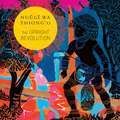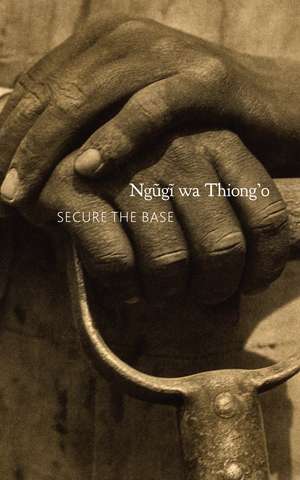Secure the Base: Making Africa Visible in the Globe: The Africa List
Autor Ngugi wa Thiong’oen Limba Engleză Hardback – 29 feb 2016
For more than sixty years, Ngugi wa Thiong’o has been writing fearlessly the questions, challenges, histories, and futures of Africans, particularly those of his homeland, Kenya. In his work, which has included plays, novels, and essays, Ngugi narrates the injustice of colonial violence and the dictatorial betrayal of decolonization, the fight for freedom and subsequent incarceration, and the aspiration toward economic equality in the face of gross inequality. With both hope and disappointment, he questions the role of language in both the organization of power structures and the pursuit of autonomy and self-expression.
Ngugi’s fiction has reached wide acclaim, but his nonfictional work, while equally brilliant, is difficult to find. Secure the Base changes this by bringing together for the first time essays spanning nearly three decades. Originating as disparate lectures and texts, this complete volume will remind readers anew of Ngugi’s power and importance. Written in a personal and accessible style, the book covers a range of issues, including the role of the intellectual, the place of Asia in Africa, labor and political struggles in an era of rampant capitalism, and the legacies of slavery and prospects for peace. At a time when Africa looms large in our discussions of globalization, Secure the Base is mandatory reading.
Ngugi’s fiction has reached wide acclaim, but his nonfictional work, while equally brilliant, is difficult to find. Secure the Base changes this by bringing together for the first time essays spanning nearly three decades. Originating as disparate lectures and texts, this complete volume will remind readers anew of Ngugi’s power and importance. Written in a personal and accessible style, the book covers a range of issues, including the role of the intellectual, the place of Asia in Africa, labor and political struggles in an era of rampant capitalism, and the legacies of slavery and prospects for peace. At a time when Africa looms large in our discussions of globalization, Secure the Base is mandatory reading.
Din seria The Africa List
-
 Preț: 294.38 lei
Preț: 294.38 lei -
 Preț: 140.77 lei
Preț: 140.77 lei -
 Preț: 77.57 lei
Preț: 77.57 lei -
 Preț: 117.62 lei
Preț: 117.62 lei -
 Preț: 135.81 lei
Preț: 135.81 lei -
 Preț: 386.32 lei
Preț: 386.32 lei -
 Preț: 131.33 lei
Preț: 131.33 lei -
 Preț: 180.84 lei
Preț: 180.84 lei -
 Preț: 102.49 lei
Preț: 102.49 lei -
 Preț: 118.15 lei
Preț: 118.15 lei -
 Preț: 103.12 lei
Preț: 103.12 lei -
 Preț: 93.35 lei
Preț: 93.35 lei -
 Preț: 300.07 lei
Preț: 300.07 lei - 19%
 Preț: 99.88 lei
Preț: 99.88 lei - 17%
 Preț: 133.47 lei
Preț: 133.47 lei - 17%
 Preț: 133.47 lei
Preț: 133.47 lei - 19%
 Preț: 80.96 lei
Preț: 80.96 lei - 18%
 Preț: 92.21 lei
Preț: 92.21 lei - 20%
 Preț: 74.41 lei
Preț: 74.41 lei -
 Preț: 164.05 lei
Preț: 164.05 lei
Preț: 119.60 lei
Preț vechi: 147.17 lei
-19% Nou
Puncte Express: 179
Preț estimativ în valută:
22.89€ • 23.81$ • 18.90£
22.89€ • 23.81$ • 18.90£
Carte indisponibilă temporar
Doresc să fiu notificat când acest titlu va fi disponibil:
Se trimite...
Preluare comenzi: 021 569.72.76
Specificații
ISBN-13: 9780857423139
ISBN-10: 0857423134
Pagini: 152
Dimensiuni: 127 x 216 x 15 mm
Greutate: 0.3 kg
Editura: Seagull Books
Colecția Seagull Books
Seria The Africa List
ISBN-10: 0857423134
Pagini: 152
Dimensiuni: 127 x 216 x 15 mm
Greutate: 0.3 kg
Editura: Seagull Books
Colecția Seagull Books
Seria The Africa List
Notă biografică
Ngugi wa Thiong'o is Distinguished Professor of English and Comparative Literature, at the University of California, Irvine. He is the author of many books, including,The River Between, Petals of Blood, Wizard of the Crow, and Decolonizing the Mind.
Cuprins
Preface
Contempt and Self-Contempt
How the Word ‘Tribe’ Obscures the Reality of African Politics
Privatize or Be Damned
Africa, Globalization and Capitalist Fundamentalism
New Frontiers of Knowledge
The Challenge of the Pan-Africanist Social Scientist
Splendour in Squalor
The Global Responsibility to Protect Humanity
The Legacy of Slavery
Nuclear-Armed Clubsmen
Weapons of Mass Destruction and the Intellectual
Writing for Peace
Or, the Two Rifts Revisited
Bibliography
Contempt and Self-Contempt
How the Word ‘Tribe’ Obscures the Reality of African Politics
Privatize or Be Damned
Africa, Globalization and Capitalist Fundamentalism
New Frontiers of Knowledge
The Challenge of the Pan-Africanist Social Scientist
Splendour in Squalor
The Global Responsibility to Protect Humanity
The Legacy of Slavery
Nuclear-Armed Clubsmen
Weapons of Mass Destruction and the Intellectual
Writing for Peace
Or, the Two Rifts Revisited
Bibliography
Recenzii
“Wa Thiong’o is the person many believe should have won [the 2016 Nobel]. . . . Wa Thing’o’s anger at the British moral hypocirzy is conveyed through characteristically elegant and restrained prose. . . . Wa Thiong’o’s vision is beautiful and inspiring.”
“Secure the Base is full of hidden connections. Born in 1938, Ngugi is one of Africa’s most venerable literary figures. In this short, tightly argued collection of lectures and essays, he writes with the aim of ‘making Africa visible in the world’ by tracing the lattice of political and moral ties that stretch across the globe and back to Africa.”
“This book does not only add to the fodder of literature in the area of global relations, it is a timely intervention that challenges the status quo and calls attention to alternatives in resetting global relations. But as is mostly the case, those who act on behalf of our nations are not necessarily the ones who read these materials. If only they would, they might be inspired to act—a stitch in time can save nine.”
"Secure the Base consists of nearly thirty years of reflection by one of the most influential African writers of our time. It is a short but dense collection of seven essays, based on some of Ngũgĩ wa Thiong’o’s most thought-provoking lectures. The book tackles a wide range of issues, such as the continued importance of looking into slavery, colonialism, and neocolonialism by tying them to economic dependence and global inequality."
